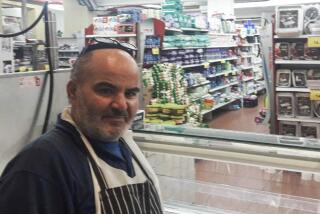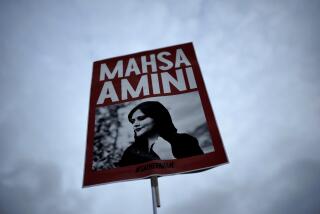Mousaviâs nephew had received threats, friends say
Reporting from Tehran and Beirut â During the dark years of the Iran-Iraq war in the 1980s, the teenage Ali Habibi-Mousavi returned home from the front for weeklong visits. Amid the gloom, the young Iranian militiaman was full of good cheer for his mother, who couldnât stop showering him with tears of relief and worry.
â âMom, I am healthy and back home!â he would say,â his mother recalled this week. â âThis is my head. This is my leg. This is my hand. All work perfectly! I do not deserve to be a martyr. I am made of metal!â â
This week Khadijeh Mousavi, the sister of Iranian opposition leader Mir-Hossein Mousavi, couldnât stop weeping again as she mourned for her 43-year-old son. He was mysteriously shot to death during antigovernment demonstrations Sunday, the Shiite Muslim religious holiday Ashura.
âHe was a charming boy,â she said through tears during a telephone interview from her Tehran home. âBut I am happy that this happened to him at noon on Ashura,â the commemoration of the martyrdom of revered Shiite saint Imam Hussein, who was felled in a 7th century battle.
âCertainly Hussein will take care of him in the next world,â she said, speaking in the singsong accent of Iranâs ethnic Azeri northwest.
A deadly wave of political unrest shook Iran last weekend, the latest in a series of antigovernment demonstrations sparked by the disputed June reelection of President Mahmoud Ahmadinejad. The government says eight people died in the violence. Opposition sources say 37 died, the most prominent of whom was Ali Habibi-Mousavi, whose uncle served as prime minister during the war.
Authorities say they had nothing to do with Habibi-Mousaviâs death and blame mysterious forces. Hossein Shariatmadari, editor of the conservative newspaper Kayhan, even accused Mir-Hossein Mousavi of staging the death of his nephew to drum up sympathy for the opposition.
But some activists say Habibi-Mousavi was probably killed by hard-line elements within Iranâs security forces that they allege have formed hit squads to carry out officially deniable acts of violence to intimidate opposition protesters and leaders.
Mohsen Makhmalbaf, a Paris-based Iranian filmmaker who has emerged as an informal spokesman for the opposition, said in a telephone interview that Habibi-Mousavi received death threats for about a week before the killing.
Iranian authorities have spared little effort in trying to keep the death from becoming a rallying point. Until The Times interview, the family had been tight-lipped about the slaying. Authorities snatched Habibi-Mousaviâs corpse from the morgue the day after he was killed, giving it back Wednesday only on condition that the family hold a quiet burial out of public view, a friend said.
Plainclothes security officials ripped down posters put up by neighbors that proclaimed Habibi-Mousavi a martyr.
Nevertheless, clashes broke out Thursday between protesters and security forces near Habibi-Mousaviâs burial site, a reformist website said.
Friends and relatives say that Habibi-Mousavi was a modest, friendly and low-key man.
When he was 14 or 15, he and his brother Ebrahim volunteered for the war effort, his mother said. Ebrahim was killed at the front in 1987.
A black-and-white photo posted on the Internet shows an exhausted Habibi-Mousavi, a bandanna wrapped around his head, embracing his father after returning from the war.
The young veteran finished high school and then worked for his uncle in the prime ministerâs office. But Habibi-Mousavi was a man of no great ambition. He was devoted to his wife and two children, and eventually went to work in his familyâs 120-square-foot store in Tehranâs labyrinthine Grand Bazaar.
At first he sold rice and tea. But eventually he began selling cheap Asian-made toys. Customers and fellow merchants in the close-knit Javaherian arcade liked him. Some merchants dimmed their lights this week as a show of respect for their slain colleague.
âHe was tactful, reserved and quiet,â said one merchant, who spoke on condition of anonymity. âAlthough in Iranian culture there are no bad dead men and no good living men, I can honestly say he was a nice chap.â
Though he voted for his uncle in last yearâs presidential election and was sympathetic to the opposition, Habibi-Mousavi did not take a leading role in the unrest shaking his country, friends and relatives said. The extent of his political activities was displaying a postcard-sized photo of his uncle and the green âVâ symbol of the opposition on his storefront.
So relatives were confused and worried when Habibi-Mousavi began receiving threatening phone calls about a week before his death. On Sunday, he was at the home of his in-laws on Shademan Street near the epicenter of the protests.
Witnesses at a grocery say he came out of the home briefly with his daughter to have a look around as clashes between security forces and protesters raged nearby. He might have known something was wrong: He asked his brother-in-law to take his daughter home.
Minutes later, a Nissan SUV filled with men wearing street clothes pulled up. A bullet pierced Habibi-Mousaviâs heart and went through his back. A photograph of his damaged leather jacket shows the bloodied exit hole. Video posted on the Internet shows what is described as his lifeless body lying on the pavement.
His mother was first told that he had been hit by a stone. But at the hospital, she spotted Habibi-Mousaviâs wife crying. âI said, âWas my son really hit by a stone? Tell me the truth. I am strong enough. I can tolerate it,â â she recalled. âThen I found out the catastrophe that befell him.â
Two days after he was killed, police said Habibi-Mousavi had been shot with a Colt .45 pistol by an unidentified person as he walked along Shademan Street. The type of weapon used suggested that a âterror teamâ committed the killing, the police said, though pro-government militiamen have been filmed and photographed during the protests carrying Colt .45s.
Police said they had detained the owner of a black Nissan SUV allegedly used in the shooting. The owner reportedly told police the car had been stolen.
The family hasnât publicly blamed authorities for the slaying. But Makhmalbaf, the filmmaker, described it as an attempt to silence reform leaders by targeting their loved ones. In recent days, the relatives of numerous prominent Iranians, including Mousaviâs brother-in-law and the sister of human rights activist Shirin Ebadi, have been arrested.
Some of Habibi-Mousaviâs friends and relatives have tried to hold a mourning ceremony for him at the Dar al Salam mosque near his home, but authorities have so far refused to allow victims of the protest violence to be publicly honored.
Thatâs OK with his mother.
âMany of the Iranian youths have been through these disasters,â she said. âWhy should my son have his own public mourning celebration in a mosque while the others cannot do so?â
She also objects to having her son become a symbol for anything.
âWe do not call him a martyr,â she said. âWhen he went to the war front I was afraid he could have been martyred. But I do not know what to call this. Is it a catastrophe, or martyrdom? I do not know.â
Mostaghim is a special correspondent.
More to Read
Sign up for Essential California
The most important California stories and recommendations in your inbox every morning.
You may occasionally receive promotional content from the Los Angeles Times.










